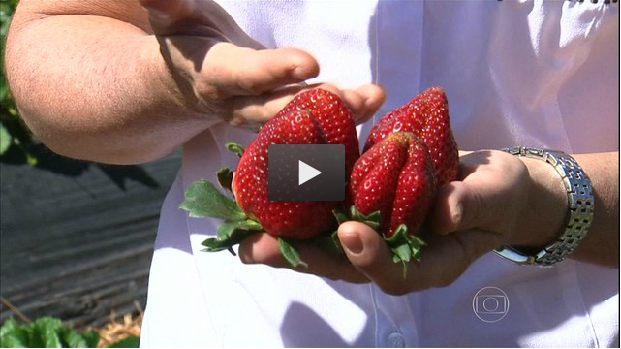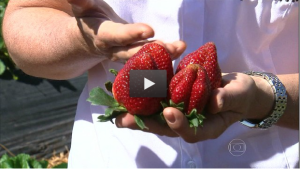
In SP, new pollination technique helps strawberry growers
Mandaguari bee is the main responsible for pollination.
Fruit ideal for the market is the result of the permanent visit of the bee.
A technique developed by Embrapa researchers has been helping strawberry producers in São Paulo. They breed stingless bees in the laboratory to enhance pollination of flowers in crops.
The mandaguari bee, species found more easily in the Southeast region of the country is the main responsible for pollination in strawberry plantations. The red fruit and in the ideal format for the market is the result of the permanent visit of the bee: without the pollen grain, the fruits look very different.
This new technique was created by researchers from the Brazilian Agricultural Research Corporation (Embrapa), from the University of São Paulo and the Federal University of the Semi-Arid. Since December last year, they are raising stingless bees to pollinate the flowers on the strawberry trees in the Jarinu and Atibaia region, one of the largest fruit producers in the country.
According to researchers, to pollinate the entire area planted with strawberries in Brazil, approximately 3 thousand hectares, would be necessary 50 thousand hives of the mandaguarí bee, but currently there are just over a thousand.
To help farmers, researchers are producing hives on a large scale. There will be three thousand a year.
At Osvaldo Mazziero's plantation, the hives have already been placed very close to the strawberry trees. Each colony has to 10 a 15 thousand bees. They will stay there throughout the harvest, after that, will be forwarded to a private company, where they will be fed and then returned to the plantations.
Researchers have already found that the losses of farmers participating in the study have decreased. With enhanced pollination, the amount of deformed fruits dropped a lot.
Now, Embrapa is going to test how bees react to the effects of pesticides used in strawberry cultivation in order to offer the producer an opportunity to keep the harvest high, with little loss.


Sorry, the comment form is closed at this time.